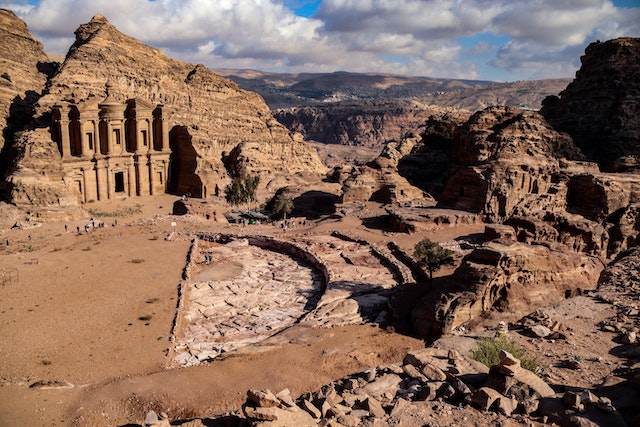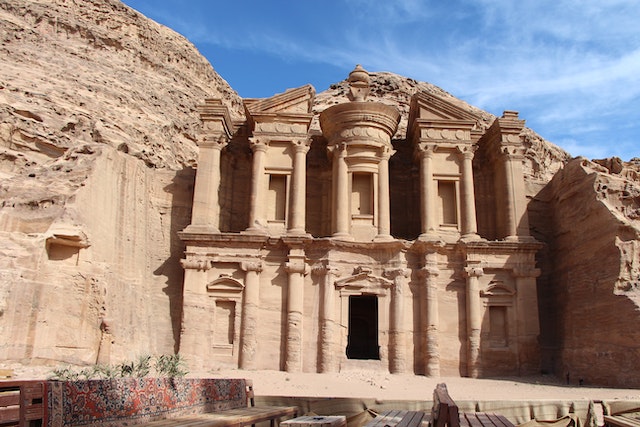In the heart of the Jordanian desert lies a city carved into rose-red cliffs, a place of astonishing beauty and historical significance—Petra. Often referred to as the “Rose-Red City,” Petra is a UNESCO World Heritage Site and one of the most mesmerizing archaeological wonders of the world. In this article, we will journey through time and space to explore the captivating history, architectural marvels, and enduring mystique of Petra.
A Glimpse into the Past
Petra’s history is shrouded in mystery, with its origins dating back to the 4th century BC. It was the capital of the Nabatean Kingdom, a nomadic Arab tribe that settled in the region. Situated at the crossroads of ancient trade routes, Petra thrived as a bustling commercial hub and a vital link between the East and West.
The Rose-Red City
What sets Petra apart is its unique architecture. The city is known for its intricate rock-cut structures, a remarkable blend of nature and human craftsmanship. Most iconic is the Al-Khazneh, or the Treasury, a breathtaking façade carved into the rose-red cliffs. The Treasury is not an actual treasury but likely a royal tomb, with its intricate carvings and towering columns evoking a sense of wonder and grandeur.
The city features numerous other structures, including the Monastery (Ad-Deir), the Royal Tombs, the Amphitheater, and the High Place of Sacrifice, each offering a glimpse into the lives and beliefs of the Nabateans.
The Mystique of Petra
Petra’s mystique lies not only in its architecture but also in the secrets it holds. The city’s intricate layout, hidden passageways, and mysterious underground chambers have fueled the imaginations of explorers, historians, and adventurers for centuries. The question of why the Nabateans chose to carve their city into rock is one that continues to intrigue scholars.
One theory is that the rock-cut architecture served as a defensive measure, providing natural protection against invaders. The city’s narrow Siq (a winding gorge) served as the main entrance and could easily be defended. Additionally, the ingenious Nabateans developed a sophisticated water management system that allowed them to thrive in this arid desert environment.

Rediscovery by Johann Ludwig Burckhardt
For centuries, Petra remained a well-guarded secret, known primarily to local Bedouin tribes. It was not until the early 19th century that the Western world learned of its existence. Swiss explorer Johann Ludwig Burckhardt, operating under the pseudonym Sheikh Ibrahim Ibn Abdallah, disguised himself as a Bedouin and infiltrated the city in 1812.
Burckhardt’s discovery captivated the world, sparking interest in Petra’s history and prompting subsequent archaeological explorations. Today, the city is a testament to the wonders that await those who venture off the beaten path.
The Role of Trade
One of Petra’s key strengths was its strategic location along ancient trade routes. It served as a vital nexus for trade between Arabia, Egypt, and the Mediterranean. Caravans laden with spices, incense, silks, and other valuable goods passed through Petra, enriching the city and its people.
As a result, Petra became a melting pot of cultures, where influences from Egypt, Rome, Greece, and the Levant converged. This rich tapestry of influences is reflected in the city’s architecture and art, making it a remarkable crossroads of civilizations.
Petra in Popular Culture
Petra’s allure extends beyond its historical significance. It has captured the imagination of filmmakers, writers, and artists. The city’s stunning backdrop has been featured in movies like “Indiana Jones and the Last Crusade,” where it stood in for the fictional “Canyon of the Crescent Moon.”
In literature, Petra has been a source of inspiration for countless authors, with its hidden chambers and desert landscapes often providing the perfect setting for tales of adventure and intrigue. Its mysterious aura continues to enchant storytellers and readers alike.
Preservation and Tourism
Petra’s popularity as a tourist destination has grown steadily over the years, attracting visitors from all corners of the globe. While tourism has brought economic benefits to the region, it has also posed challenges for the preservation of the site. Managing foot traffic, protecting delicate carvings, and conserving the fragile desert ecosystem are ongoing concerns.
Efforts to balance tourism and conservation are crucial. Local authorities have implemented regulations and guidelines to protect Petra’s heritage while still offering visitors an opportunity to experience its magic. Responsible tourism is encouraged, emphasizing the importance of respecting this ancient wonder and leaving as little impact as possible.
A Glimpse of Petra Today
Visiting Petra today is an adventure into the past. As you walk through the narrow Siq, the towering cliffs gradually reveal the magnificent Treasury, an experience that is both humbling and awe-inspiring. Exploring the city’s countless tombs, caves, and rock-cut facades is like stepping into a time machine, allowing you to connect with the ancient Nabateans and their remarkable achievements.
For the more adventurous traveler, there are hikes to the Monastery, which rewards you with panoramic views of the surrounding desert, and the High Place of Sacrifice, where ceremonies and offerings once took place.
Conclusion
Petra, the Rose-Red City, is not just a historical site; it is a testament to human creativity, resilience, and ingenuity. Its enigmatic beauty, intricate architecture, and cultural significance continue to captivate the world. Petra invites us to explore its mysteries, admire its artistry, and appreciate the rich history that it represents.
As we tread in the footsteps of explorers and adventurers like Johann Ludwig Burckhardt, we are reminded that there are still wonders waiting to be uncovered in our world. Petra is a timeless reminder that history is etched into the very stones of our planet, and its stories are waiting to be discovered by those willing to embark on the journey.


